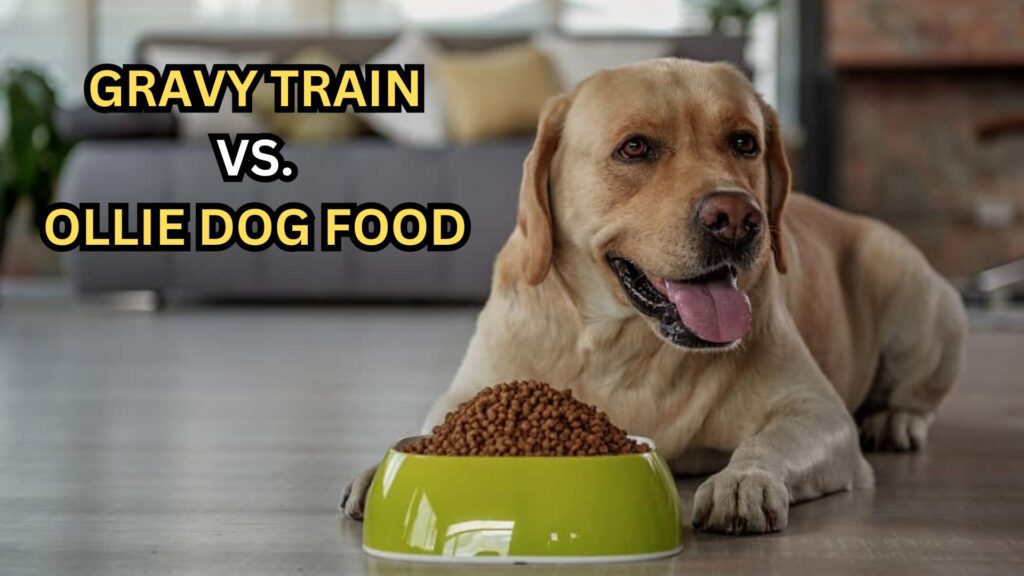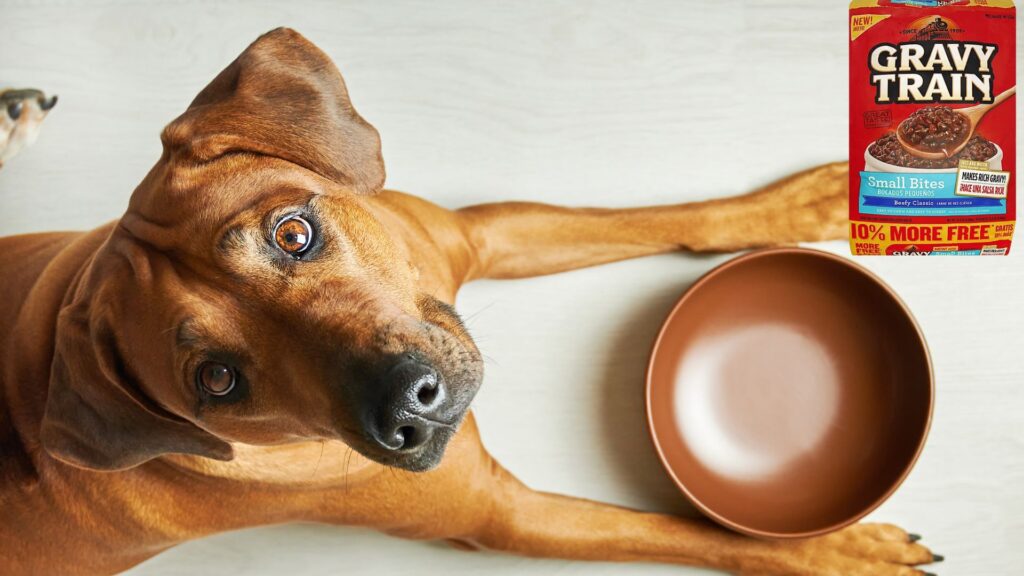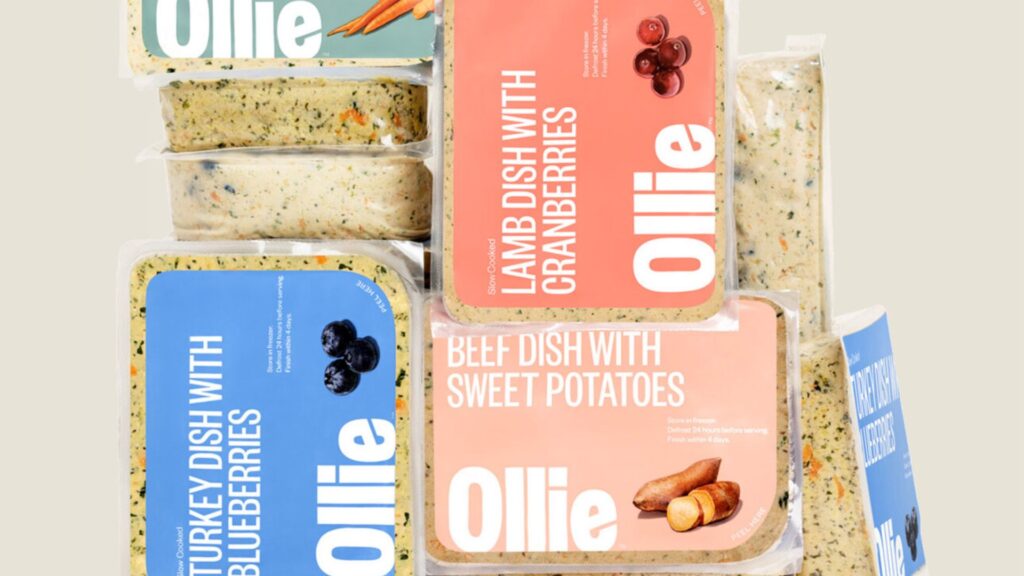Choosing the right food for your beloved pet can be a daunting task, especially with the myriad options available on the market. In this blog post, we delve into two popular dog food brands, Gravy Train and Ollie, to help dog owners make informed decisions based on comprehensive comparisons and insights.

Gravy Train has been a familiar name in many American households, known for its cost-effective and easy-to-prepare meals.
However, its market presence and consumer perception have evolved over the years, affected by changes in ownership and consumer preferences towards more premium, health-conscious pet foods.
On the other end of the spectrum is Ollie, a newer entrant in the pet food market that has rapidly gained attention for its fresh, human-grade dog food.
Ollie stands out with its personalized meal plans tailored to the specific nutritional needs of each dog, promoting overall health and well-being.
Who Makes Gravy Train Dog Food?
Gravy Train’s journey began in the early 1950s, introduced as one of the first brands to offer dog food that creates its own gravy when warm water is added. This innovation appealed to pet owners looking for convenient yet appetizing meal options for their pets.
Over the decades, Gravy Train has changed hands multiple times. Today, it is manufactured by Big Heart Pet Brands, a subsidiary of the J.M. Smucker Company, which acquired the brand in 2015.
Under the umbrella of J.M. Smucker, Gravy Train benefits from extensive resources and industry expertise, but it also faces challenges related to maintaining quality and authenticity in the face of mass production.
While specific manufacturing processes and ingredient sourcing details are proprietary, the brand has maintained its position in the market by offering an economical choice for dog owners.
Overview of Ollie vs. Gravy Train Dog Foods

In stark contrast to Gravy Train’s longstanding history, Ollie was founded in 2016 with the mission to provide dogs with the healthiest food possible. Ollie’s approach is based on the belief that pets deserve the same quality of food as humans.
Each meal plan is crafted based on an individual dog’s specific needs, including age, breed, activity level, and allergies, ensuring a balanced diet formulated by veterinary nutritionists.
Ollie differentiates itself not just with its product, but with its service. The meals are prepared in the USA, cooked gently to preserve nutrients, and then shipped directly to the customer’s door in refrigerated boxes.
This direct-to-consumer model allows Ollie to maintain control over the freshness and quality of its products, which appeals to pet owners who prioritize health and premium ingredients for their pets.
Both Gravy Train and Ollie represent different spectrums of the dog food market. Gravy Train stands as a testament to traditional, affordable pet food, while Ollie continues to carve a niche in the premium, health-centric segment.
This analysis will help illuminate which brand might be the right choice for your dog, considering various factors such as diet, budget, and personal values.
Comparative Analysis

When selecting the right dog food, understanding the differences in ingredient quality, nutritional value, price, and product variety can significantly influence a pet owner’s decision.
Below, we provide a detailed comparison of Gravy Train and Ollie, highlighting these key factors.
Ingredient Quality
| Ingredient Focus | Gravy Train | Ollie |
|---|---|---|
| Primary Ingredients | Corn, soybean meal, beef and bone meal, animal fat | Chicken, beef, turkey, lamb (depends on the recipe) |
| Additives | Artificial colors, flavors, and preservatives | None; all-natural ingredients |
| Special Dietary Options | Limited specialty options | Customizable for allergies, weight control, etc. |
Analysis:
Gravy Train’s ingredient list reflects its positioning as a more economically priced brand, utilizing fillers like corn and soybean meal along with meat by-products.
In contrast, Ollie uses whole meats and fresh vegetables, which are generally better for digestion and nutrition. Ollie also avoids artificial additives, focusing on all-natural ingredients, which is a significant advantage for dogs with sensitive stomachs or allergies.
Nutritional Value
| Nutritional Focus | Gravy Train (% based on dry matter basis) | Ollie (% based on dry matter basis) |
|---|---|---|
| Protein | Approximately 21% | Ranges from 35% to 44% |
| Fat | Approximately 10% | Ranges from 20% to 25% |
| Fiber | Approximately 4% | Approximately 2% |
| Moisture | Approximately 10% | Approximately 70% (fresh food) |
Analysis:
Ollie’s formulations generally contain higher protein and fat contents, indicative of higher meat content and overall food quality.
The moisture level in Ollie’s food is much higher due to it being fresh food compared to Gravy Train’s dry formulas, which can be beneficial for hydration but also means it provides less caloric density per gram.
Price and Value
| Pricing Comparison | Gravy Train | Ollie |
|---|---|---|
| Cost per Serving | Approximately $0.50 per serving | Approximately $3.00 per serving |
Analysis:
There is a significant difference in the cost per serving between Gravy Train and Ollie, reflecting the disparity in ingredient quality and production methods.
Gravy Train offers a more budget-friendly option, while Ollie’s pricing reflects its premium ingredients and personalized meal plans.
Product Variety
| Product Types | Gravy Train | Ollie |
|---|---|---|
| Dry Food | Available | Not Available |
| Wet Food | Available | Customizable fresh meals |
| Treats | Available | Available |
| Special Diets | Basic options (puppy, adult) | Tailored to individual needs |
Analysis:
Gravy Train provides a range of dry and wet food products, catering to general needs. Ollie, however, focuses solely on fresh, wet meals that are tailored to the specific dietary requirements of each dog, which can include considerations for age, health issues, and even taste preferences.
The comparative analysis above outlines distinct differences between Gravy Train and Ollie. While Gravy Train might be suitable for pet owners looking for a more economical option, Ollie offers a premium alternative tailored to the nutritional needs of individual dogs with a focus on fresh, high-quality ingredients.
Choosing between these brands depends largely on a pet owner’s budget, the importance placed on ingredient quality, and the specific health needs of their dog.
Consumer Perception and Market Reception
Consumer perception of a brand significantly affects its success and reputation in the market.
Both Gravy Train and Ollie have carved out their distinct positions, each appealing to different segments of pet owners.
Gravy Train

Gravy Train has been a staple in the pet food market for decades, appealing to budget-conscious consumers looking for affordable pet food options. However, the brand has faced criticism and skepticism regarding the quality of its ingredients and the use of additives such as artificial colors and flavors.
In terms of market reception, Gravy Train has experienced fluctuating consumer trust, particularly after incidents like the 2018 voluntary recall due to potential contamination with pentobarbital, a euthanasia drug.
Despite these challenges, many consumers remain loyal to the brand, primarily due to its cost-effectiveness and wide availability.
Ollie

Ollie, as a premium dog food brand, generally receives positive reviews for its high-quality ingredients and customized meal plans. Customers appreciate the freshness of the food and the convenience of having it delivered directly to their homes.
The transparency regarding sourcing and manufacturing boosts consumer trust. While Ollie’s products are priced higher than many conventional dog foods, the brand has successfully cultivated a reputation for delivering superior nutritional value and excellent customer service, which resonates well with a more health-conscious consumer base.
FAQs
Who owns Gravy Train dog food, and how does it impact product quality?
Gravy Train is owned by Big Heart Pet Brands, a subsidiary of the J.M. Smucker Company. Ownership by a large conglomerate provides resources for production and distribution but can sometimes lead to compromises on ingredient quality to maintain cost-effectiveness.
This relationship is crucial as it underscores the balance between quality and affordability that Gravy Train strives to achieve.
How does Ollie ensure the freshness and quality of its meals?
Ollie ensures the freshness and quality of its meals by preparing them in small batches in US kitchens. The meals are made using human-grade ingredients and are quickly frozen to lock in freshness.
Ollie’s direct-to-consumer model means meals are shipped in refrigerated boxes directly to customers’ doors, minimizing the time meals spend in transit and ensuring they remain fresh until they reach the dog’s bowl.
Is Gravy Train suitable for all dog breeds and ages?
Gravy Train offers a range of products suitable for different life stages, from puppies to adults. However, due to its use of fillers and artificial ingredients, it might not be the best choice for all dogs, especially those with specific health issues or dietary sensitivities.
It is always recommended to consult a veterinarian to determine the most appropriate diet for your dog’s individual needs.
What makes Ollie different from other premium dog food brands?
Ollie sets itself apart by offering personalized meal plans tailored to the specific dietary needs and preferences of each dog. This customization is supported by consultations with veterinary nutritionists.
Furthermore, Ollie’s commitment to using only high-quality, human-grade ingredients distinguishes it from other premium brands that might not offer the same level of personalization or ingredient transparency.
Where can I buy Gravy Train and Ollie dog foods, and are there any subscription options?
Gravy Train is widely available in most major pet stores, supermarkets, and online retailers. Ollie, on the other hand, operates primarily through its online subscription service, which allows customers to set up regular deliveries directly to their homes, tailored to their dog’s meal plan requirements.


